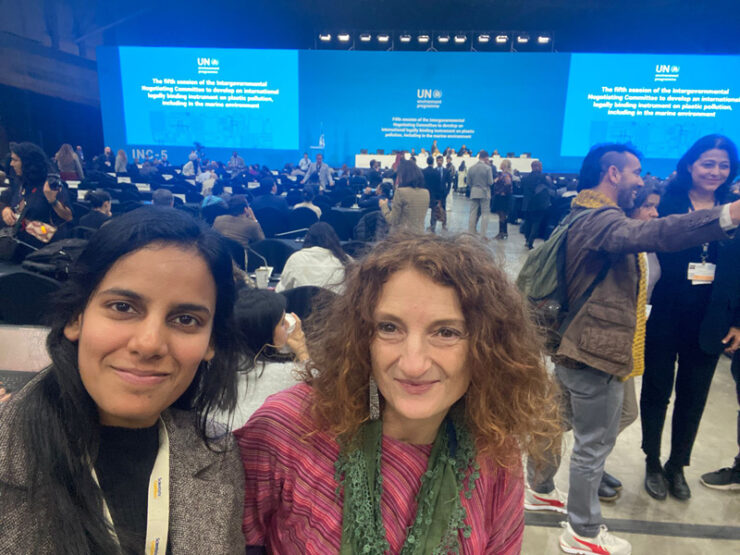The last week of November 2024 in Busan (South Korea), SCAR joined as an observer NGO the Fifth Session of the Intergovernmental Negotiating Committee (INC-5) of the Plastic Treaty to develop an international legally binding instrument on plastic pollution, including in the marine environment (INC-5) under the umbrella of the United Nations Environment Programme.
The co-chair of the SCAR PLASTIC in Polar Environment Expert group (PLASTIC-EG) represented by Clara Manno and the early career member Aanchal Jain attended the event as SCAR delegates.

After two years of negotiations, no agreement was reached by UN member states on this first-ever global legally binding instrument to end plastic pollution. The INC-5 session, which is now suspended and will continue in 2025, centered on key discussions about the prevention of plastic waste, enhancement of recycling systems, and fostering international cooperation.
INC-5 brought together a diverse group of stakeholders from around the world, including policymakers, scientists, representatives from non-governmental organizations (NGOs), indigenous knowledge holders, and environmental advocates. The variety of expertise underscored the global urgency of addressing plastic pollution, a crisis that is not confined to the most developed and urbanized areas of the planet but has also reached even the most remote and pristine regions such as the polar environments.
During the INC-5 session, SCAR delegate Clara Manno participated in a side event, shedding light on the alarming levels of plastic pollution in remote regions, including Antarctica and the Southern Ocean. She shared insights from SCAR’s scientific programs on marine debris and its impacts on Antarctic biodiversity and the mission of the newly promoted SCAR PLASTIC Expert Group. Since the foundation in 2018 of the former PLASTIC Action Group, SCAR recognized and embraced the pioneering role on advocating how the Southern Ocean and Antarctica, once perceived as untouched by human footprint, are now increasingly affected by plastic pollution originating from either global (via ocean currents and movement of air masses), or local sources (tourism, fishing and scientific stations). This unexpected plastic pollution poses a significant threat to marine biodiversity, fragile polar ecosystems and associated unique and critical ecosystem services. Polar regions play a vital role in global climate regulation and are home to unique biodiversity, making their protection essential.
 An effective international plastic treaty is crucial to ensuring global commitments also for remote regions to tackle and reduce plastic pollution and its impact, and safeguard such vulnerable environments. Therefore, it is critically important that the impact of plastic pollution on Southern Ocean ecosystems not be considered in isolation but set within a global context. It is also essential that scientific research addresses this issue in a transdisciplinary manner, encompassing knowledge and competencies from both global and regional experts across a variety of scientific disciplines from biological and physical sciences to policy and environmental economy. Understanding the interconnection and potential cumulative impact between the various anthropogenic stressors (including other pollutants and climate change) affecting the Antarctic must be considered a priority in order to properly assess the impact of plastic pollution. The SCAR PLASTIC EG recognized that it is important and timely to develop a comprehensive understanding of sources and impacts of plastic pollution in the Southern Ocean and to understand responses of already stressed marine and terrestrial ecosystems. This information is urgently required to identify critical thresholds of ecological impact due to plastic pollution and to support effective and sustainable management strategies across different sectors.
An effective international plastic treaty is crucial to ensuring global commitments also for remote regions to tackle and reduce plastic pollution and its impact, and safeguard such vulnerable environments. Therefore, it is critically important that the impact of plastic pollution on Southern Ocean ecosystems not be considered in isolation but set within a global context. It is also essential that scientific research addresses this issue in a transdisciplinary manner, encompassing knowledge and competencies from both global and regional experts across a variety of scientific disciplines from biological and physical sciences to policy and environmental economy. Understanding the interconnection and potential cumulative impact between the various anthropogenic stressors (including other pollutants and climate change) affecting the Antarctic must be considered a priority in order to properly assess the impact of plastic pollution. The SCAR PLASTIC EG recognized that it is important and timely to develop a comprehensive understanding of sources and impacts of plastic pollution in the Southern Ocean and to understand responses of already stressed marine and terrestrial ecosystems. This information is urgently required to identify critical thresholds of ecological impact due to plastic pollution and to support effective and sustainable management strategies across different sectors.
As negotiations for a global plastic treaty continue in 2025, SCAR through the PLASTIC EG remains committed to ensuring that the unique challenges faced by Antarctica and the Southern Ocean are represented, recognizing that only with global, science-based criteria to identify problematic plastic products and chemicals of concern we will reduce primary plastic polymer production to sustainable and safe levels.
